Business Ethics Report: Adidas Sweatshops and Ethical Dilemmas
VerifiedAdded on 2021/05/30
|5
|960
|22
Report
AI Summary
This report examines the ethical dilemmas faced by Adidas concerning the working conditions and exploitation of laborers in its manufacturing facilities. It analyzes the issue at individual, organizational, and corporate social levels, focusing on the mistreatment of workers, low wages, and the suppression of worker rights. The report explores the impact of these practices on Adidas's reputation and stakeholders, including customers, shareholders, and employees. It also considers the role of corporate social responsibility (CSR) and the need for Adidas to prioritize ethical conduct. The report concludes with recommendations for improving working conditions, ensuring compliance with labor laws, and adopting a proactive approach to protect workers' rights within its supply chain. The analysis is supported by a review of existing literature on the topic.
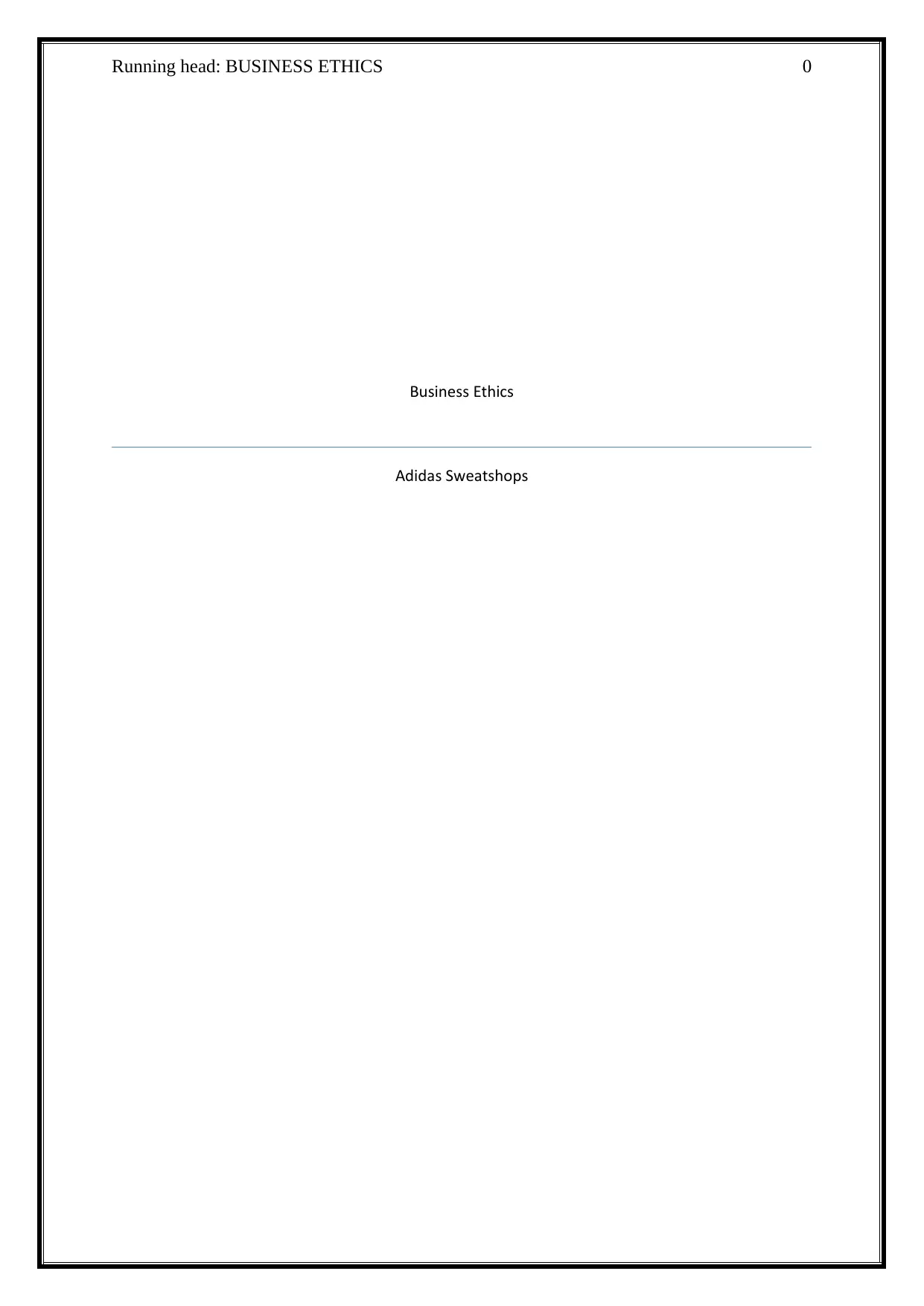
Running head: BUSINESS ETHICS 0
Business Ethics
Adidas Sweatshops
Business Ethics
Adidas Sweatshops
Paraphrase This Document
Need a fresh take? Get an instant paraphrase of this document with our AI Paraphraser
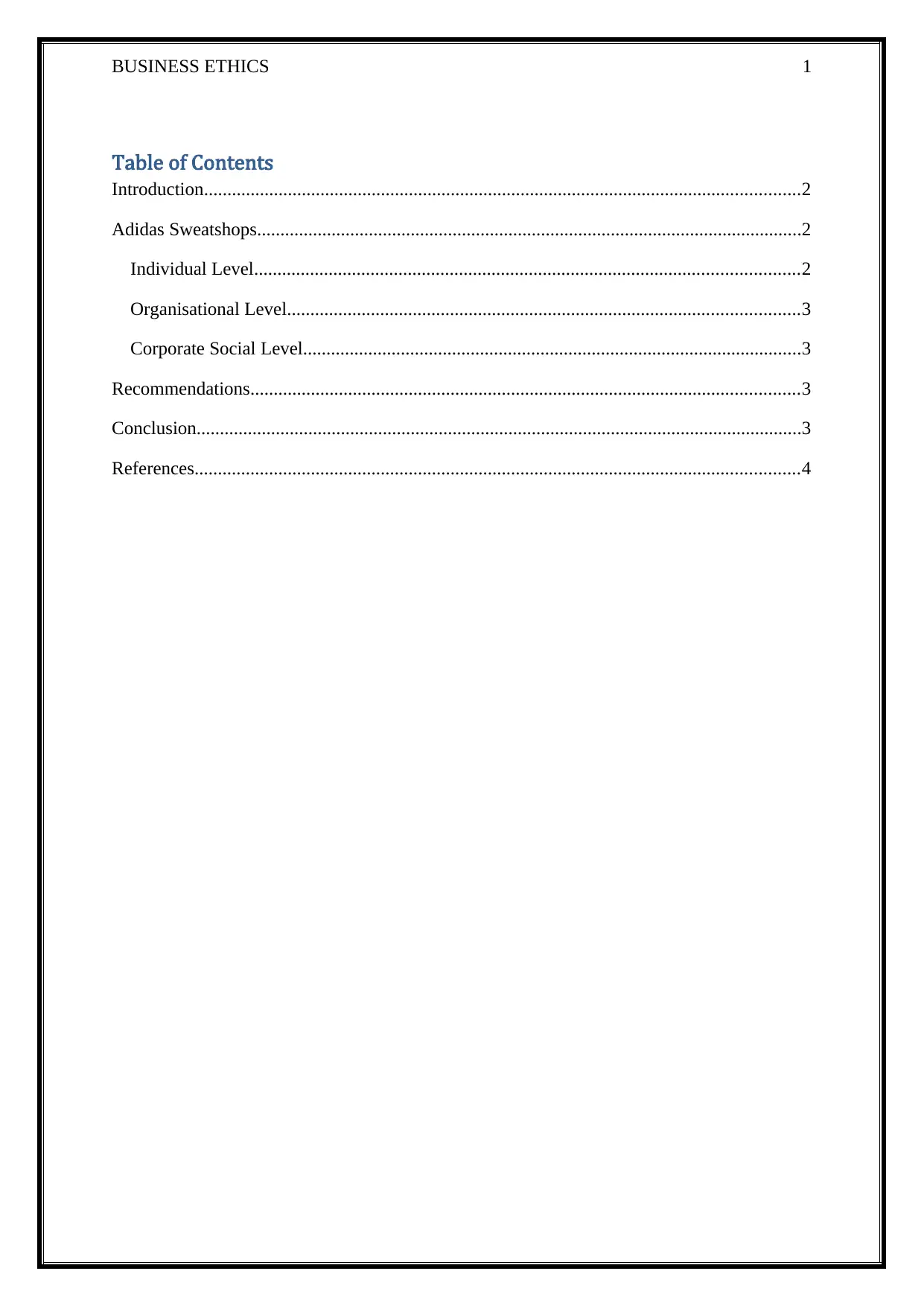
BUSINESS ETHICS 1
Table of Contents
Introduction................................................................................................................................2
Adidas Sweatshops.....................................................................................................................2
Individual Level.....................................................................................................................2
Organisational Level..............................................................................................................3
Corporate Social Level...........................................................................................................3
Recommendations......................................................................................................................3
Conclusion..................................................................................................................................3
References..................................................................................................................................4
Table of Contents
Introduction................................................................................................................................2
Adidas Sweatshops.....................................................................................................................2
Individual Level.....................................................................................................................2
Organisational Level..............................................................................................................3
Corporate Social Level...........................................................................................................3
Recommendations......................................................................................................................3
Conclusion..................................................................................................................................3
References..................................................................................................................................4
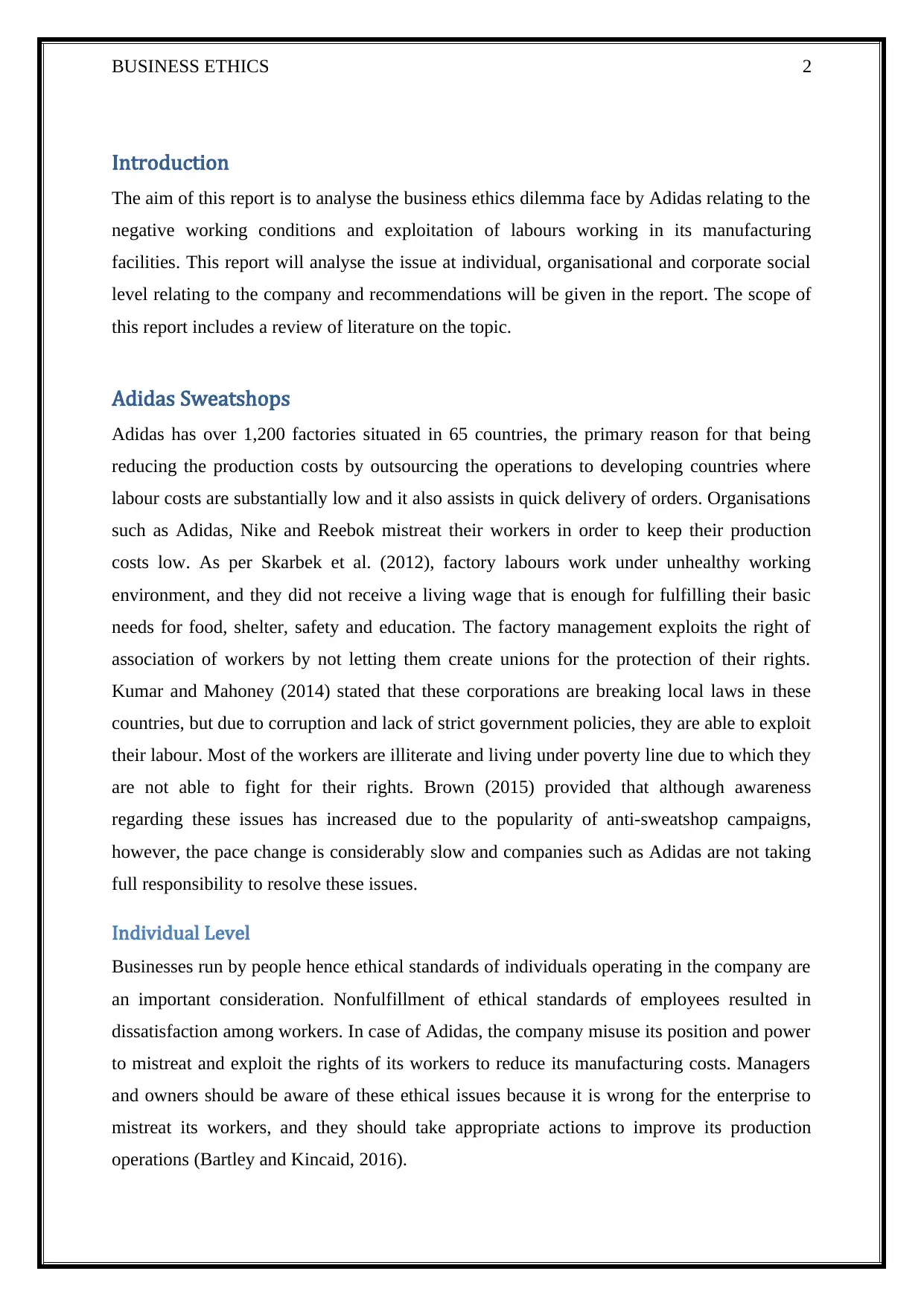
BUSINESS ETHICS 2
Introduction
The aim of this report is to analyse the business ethics dilemma face by Adidas relating to the
negative working conditions and exploitation of labours working in its manufacturing
facilities. This report will analyse the issue at individual, organisational and corporate social
level relating to the company and recommendations will be given in the report. The scope of
this report includes a review of literature on the topic.
Adidas Sweatshops
Adidas has over 1,200 factories situated in 65 countries, the primary reason for that being
reducing the production costs by outsourcing the operations to developing countries where
labour costs are substantially low and it also assists in quick delivery of orders. Organisations
such as Adidas, Nike and Reebok mistreat their workers in order to keep their production
costs low. As per Skarbek et al. (2012), factory labours work under unhealthy working
environment, and they did not receive a living wage that is enough for fulfilling their basic
needs for food, shelter, safety and education. The factory management exploits the right of
association of workers by not letting them create unions for the protection of their rights.
Kumar and Mahoney (2014) stated that these corporations are breaking local laws in these
countries, but due to corruption and lack of strict government policies, they are able to exploit
their labour. Most of the workers are illiterate and living under poverty line due to which they
are not able to fight for their rights. Brown (2015) provided that although awareness
regarding these issues has increased due to the popularity of anti-sweatshop campaigns,
however, the pace change is considerably slow and companies such as Adidas are not taking
full responsibility to resolve these issues.
Individual Level
Businesses run by people hence ethical standards of individuals operating in the company are
an important consideration. Nonfulfillment of ethical standards of employees resulted in
dissatisfaction among workers. In case of Adidas, the company misuse its position and power
to mistreat and exploit the rights of its workers to reduce its manufacturing costs. Managers
and owners should be aware of these ethical issues because it is wrong for the enterprise to
mistreat its workers, and they should take appropriate actions to improve its production
operations (Bartley and Kincaid, 2016).
Introduction
The aim of this report is to analyse the business ethics dilemma face by Adidas relating to the
negative working conditions and exploitation of labours working in its manufacturing
facilities. This report will analyse the issue at individual, organisational and corporate social
level relating to the company and recommendations will be given in the report. The scope of
this report includes a review of literature on the topic.
Adidas Sweatshops
Adidas has over 1,200 factories situated in 65 countries, the primary reason for that being
reducing the production costs by outsourcing the operations to developing countries where
labour costs are substantially low and it also assists in quick delivery of orders. Organisations
such as Adidas, Nike and Reebok mistreat their workers in order to keep their production
costs low. As per Skarbek et al. (2012), factory labours work under unhealthy working
environment, and they did not receive a living wage that is enough for fulfilling their basic
needs for food, shelter, safety and education. The factory management exploits the right of
association of workers by not letting them create unions for the protection of their rights.
Kumar and Mahoney (2014) stated that these corporations are breaking local laws in these
countries, but due to corruption and lack of strict government policies, they are able to exploit
their labour. Most of the workers are illiterate and living under poverty line due to which they
are not able to fight for their rights. Brown (2015) provided that although awareness
regarding these issues has increased due to the popularity of anti-sweatshop campaigns,
however, the pace change is considerably slow and companies such as Adidas are not taking
full responsibility to resolve these issues.
Individual Level
Businesses run by people hence ethical standards of individuals operating in the company are
an important consideration. Nonfulfillment of ethical standards of employees resulted in
dissatisfaction among workers. In case of Adidas, the company misuse its position and power
to mistreat and exploit the rights of its workers to reduce its manufacturing costs. Managers
and owners should be aware of these ethical issues because it is wrong for the enterprise to
mistreat its workers, and they should take appropriate actions to improve its production
operations (Bartley and Kincaid, 2016).
⊘ This is a preview!⊘
Do you want full access?
Subscribe today to unlock all pages.

Trusted by 1+ million students worldwide
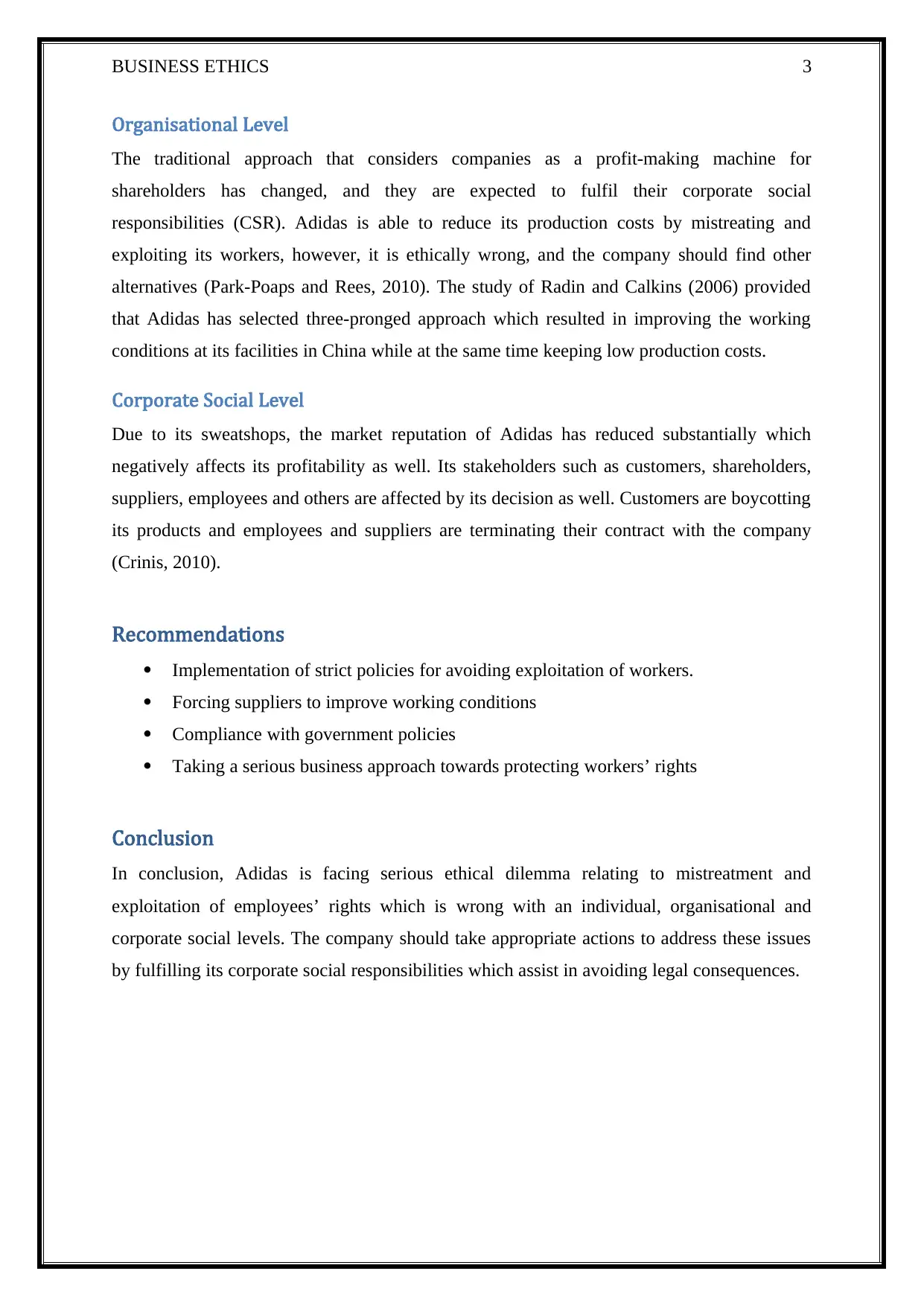
BUSINESS ETHICS 3
Organisational Level
The traditional approach that considers companies as a profit-making machine for
shareholders has changed, and they are expected to fulfil their corporate social
responsibilities (CSR). Adidas is able to reduce its production costs by mistreating and
exploiting its workers, however, it is ethically wrong, and the company should find other
alternatives (Park-Poaps and Rees, 2010). The study of Radin and Calkins (2006) provided
that Adidas has selected three-pronged approach which resulted in improving the working
conditions at its facilities in China while at the same time keeping low production costs.
Corporate Social Level
Due to its sweatshops, the market reputation of Adidas has reduced substantially which
negatively affects its profitability as well. Its stakeholders such as customers, shareholders,
suppliers, employees and others are affected by its decision as well. Customers are boycotting
its products and employees and suppliers are terminating their contract with the company
(Crinis, 2010).
Recommendations
Implementation of strict policies for avoiding exploitation of workers.
Forcing suppliers to improve working conditions
Compliance with government policies
Taking a serious business approach towards protecting workers’ rights
Conclusion
In conclusion, Adidas is facing serious ethical dilemma relating to mistreatment and
exploitation of employees’ rights which is wrong with an individual, organisational and
corporate social levels. The company should take appropriate actions to address these issues
by fulfilling its corporate social responsibilities which assist in avoiding legal consequences.
Organisational Level
The traditional approach that considers companies as a profit-making machine for
shareholders has changed, and they are expected to fulfil their corporate social
responsibilities (CSR). Adidas is able to reduce its production costs by mistreating and
exploiting its workers, however, it is ethically wrong, and the company should find other
alternatives (Park-Poaps and Rees, 2010). The study of Radin and Calkins (2006) provided
that Adidas has selected three-pronged approach which resulted in improving the working
conditions at its facilities in China while at the same time keeping low production costs.
Corporate Social Level
Due to its sweatshops, the market reputation of Adidas has reduced substantially which
negatively affects its profitability as well. Its stakeholders such as customers, shareholders,
suppliers, employees and others are affected by its decision as well. Customers are boycotting
its products and employees and suppliers are terminating their contract with the company
(Crinis, 2010).
Recommendations
Implementation of strict policies for avoiding exploitation of workers.
Forcing suppliers to improve working conditions
Compliance with government policies
Taking a serious business approach towards protecting workers’ rights
Conclusion
In conclusion, Adidas is facing serious ethical dilemma relating to mistreatment and
exploitation of employees’ rights which is wrong with an individual, organisational and
corporate social levels. The company should take appropriate actions to address these issues
by fulfilling its corporate social responsibilities which assist in avoiding legal consequences.
Paraphrase This Document
Need a fresh take? Get an instant paraphrase of this document with our AI Paraphraser
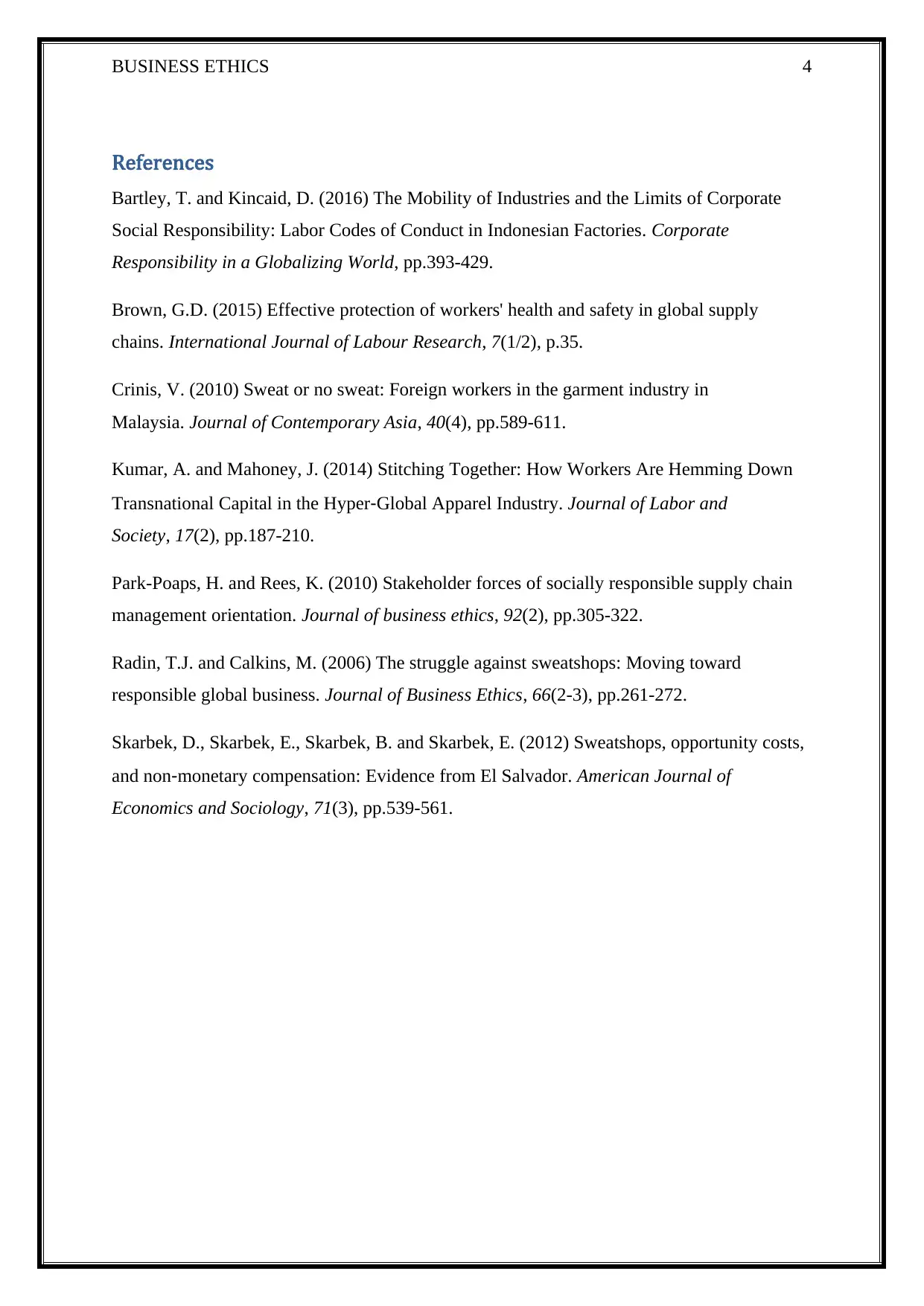
BUSINESS ETHICS 4
References
Bartley, T. and Kincaid, D. (2016) The Mobility of Industries and the Limits of Corporate
Social Responsibility: Labor Codes of Conduct in Indonesian Factories. Corporate
Responsibility in a Globalizing World, pp.393-429.
Brown, G.D. (2015) Effective protection of workers' health and safety in global supply
chains. International Journal of Labour Research, 7(1/2), p.35.
Crinis, V. (2010) Sweat or no sweat: Foreign workers in the garment industry in
Malaysia. Journal of Contemporary Asia, 40(4), pp.589-611.
Kumar, A. and Mahoney, J. (2014) Stitching Together: How Workers Are Hemming Down
Transnational Capital in the Hyper‐Global Apparel Industry. Journal of Labor and
Society, 17(2), pp.187-210.
Park-Poaps, H. and Rees, K. (2010) Stakeholder forces of socially responsible supply chain
management orientation. Journal of business ethics, 92(2), pp.305-322.
Radin, T.J. and Calkins, M. (2006) The struggle against sweatshops: Moving toward
responsible global business. Journal of Business Ethics, 66(2-3), pp.261-272.
Skarbek, D., Skarbek, E., Skarbek, B. and Skarbek, E. (2012) Sweatshops, opportunity costs,
and non‐monetary compensation: Evidence from El Salvador. American Journal of
Economics and Sociology, 71(3), pp.539-561.
References
Bartley, T. and Kincaid, D. (2016) The Mobility of Industries and the Limits of Corporate
Social Responsibility: Labor Codes of Conduct in Indonesian Factories. Corporate
Responsibility in a Globalizing World, pp.393-429.
Brown, G.D. (2015) Effective protection of workers' health and safety in global supply
chains. International Journal of Labour Research, 7(1/2), p.35.
Crinis, V. (2010) Sweat or no sweat: Foreign workers in the garment industry in
Malaysia. Journal of Contemporary Asia, 40(4), pp.589-611.
Kumar, A. and Mahoney, J. (2014) Stitching Together: How Workers Are Hemming Down
Transnational Capital in the Hyper‐Global Apparel Industry. Journal of Labor and
Society, 17(2), pp.187-210.
Park-Poaps, H. and Rees, K. (2010) Stakeholder forces of socially responsible supply chain
management orientation. Journal of business ethics, 92(2), pp.305-322.
Radin, T.J. and Calkins, M. (2006) The struggle against sweatshops: Moving toward
responsible global business. Journal of Business Ethics, 66(2-3), pp.261-272.
Skarbek, D., Skarbek, E., Skarbek, B. and Skarbek, E. (2012) Sweatshops, opportunity costs,
and non‐monetary compensation: Evidence from El Salvador. American Journal of
Economics and Sociology, 71(3), pp.539-561.
1 out of 5
Related Documents
Your All-in-One AI-Powered Toolkit for Academic Success.
+13062052269
info@desklib.com
Available 24*7 on WhatsApp / Email
![[object Object]](/_next/static/media/star-bottom.7253800d.svg)
Unlock your academic potential
Copyright © 2020–2026 A2Z Services. All Rights Reserved. Developed and managed by ZUCOL.





